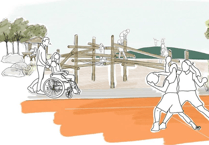THE British Army in June 1815, together with contingents from other countries, was drawn up on the heights near a place called Waterloo.
A young English artillery officer galloped up to the Duke and shouted excitedly “Napoleon has come within range. Permission to fire, sir”. Wellington turned and snapped “Certainly not, get back to your guns”. One English General had assessed Napoleon’s presence on a battlefield as equal to the arrival of 50,000 fresh troops but assassinating him was unthinkable.
Today, killing enemy leaders from a safe distance has become a prime objective.
Some time ago America’s most modern destroyer the Donald Scott entered the Black Sea and sailed along the Russian coast just outside the 12 mile limit.
The Russians scrambled 2 SU24 warplanes. Suddenly all the screens and command systems went blank making the American ship utterly defenceless, as the Russian pilot circled round it at deck level.
According to a usually reliable source on the web, 29 American sailors have applied for shore postings feeling they have no protection at sea.
Warfare has come a long way since that June day when the Coldstream Guards spent the day beating off ferocious French attacks on the large farmhouse that was the key to the British position in that terrible and close-run battle at Waterloo. Warfare involves movement in a resistant medium.
I remember listening with excitement to the BBC on D Day when 125,000 allied troops fought their way ashore in Normandy.
Some 5,000 of them were killed that day. Just under 400 American bombers had flown ahead of them in support to bomb Omaha beach to crush the defences and leave lots of craters for the Americans to take cover in.
Not one single bomb hit the beach and to this day, unbelievably, no one knows where the bombs were dropped.
A month ago the Americans bombed and wrecked the hospital in Kabul which was run by the Medecins sans Frontières.
One of the staff had confirmed the co-ordinates of this large hospital the morning before the attack.
Most of the staff and patients escaped but a few did not make it. Just one of those things.
What does war achieve? In the Normandy campaign that followed, 200,000 allied troops were casualties in liberating Normandy and even more Germans perished. Also there were 80,000 French civilian casualties. It had to be done.
At the anniversary at Waterloo the Prince of Wales claimed that the British had liberated France.
In fact Louis XVIII, a nasty man, had fled before the battle when his army had rallied to Napoleon.
Louis was restored to his throne after Napoleon’s defeat and resumed his tyranny. Overwhelmingly it was Napoleon who was regarded as the liberator not only in France but many other countries ruled by despots.
Surely at the time of Christmas, in which our children find so much love and magic, it is time for our so-called civilisation to place PEACE at the top of every political check list. But let us get our history straight.
– Roger Horsfield, Bream.




Comments
This article has no comments yet. Be the first to leave a comment.